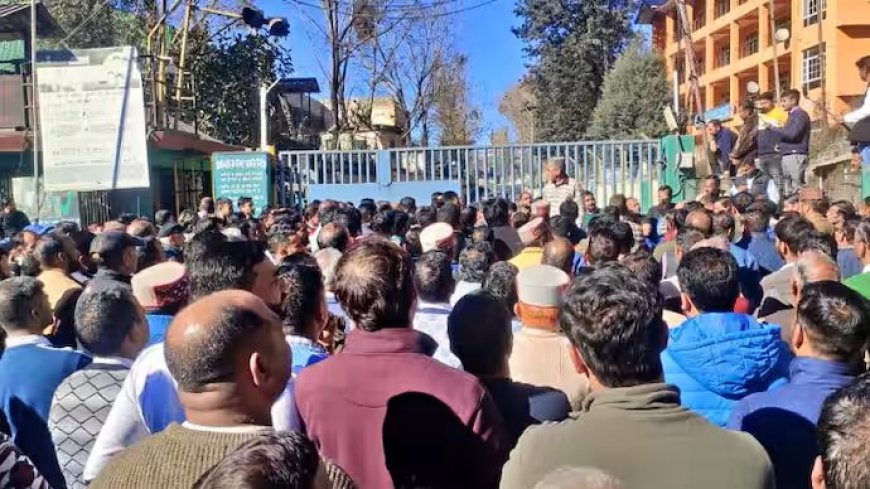एक झटके में हजारों इंडस्ट्री बंद-लाखों लोग होंगे बेरोजगार...वजह दिल्ली का आदेश
जयपुर. दिल्ली और राष्ट्रीय राजधानी क्षेत्र (NCR) के आसपास प्रदूषण के बढ़ते स्तर के कारण राजस्थान के अलवर और भरतपुर जिले में ग्रेडेड रिस्पांस एक्शन प्लान (GRAP) के चौथे चरण को लागू किया गया है। राजस्थान पॉल्यूशन कंट्रोल बोर्ड ने मंगलवार को इस बाबत आदेश जारी करते हुए इन दो जिलों में 3000 से अधिक खनन और उद्योगों को बंद कर दिया। साथ ही, निर्माण कार्यों पर भी तत्काल रोक लगा दी गई है। इससे यातायात पर भी प्रभाव पड़ने की संभावना है, क्योंकि GRAP-4 के लागू होने के बाद भारी वाहन इन जिलों में प्रवेश नहीं कर पाएंगे, हालांकि, आवश्यक सामग्री के वाहन इस नियम से बाहर रहेंगे।
जॉब के साथ गंभीर बीमारियां भी होंगी?
इस समय, अलवर और भरतपुर में वायु गुणवत्ता सूचकांक (AQI) 200 के पार पहुंच चुका है। अलवर में AQI 233 जबकि भरतपुर में यह 267 रिकॉर्ड किया गया है। AQI का 0-50 के बीच होना 'अच्छा' माना जाता है, जबकि 101-200 'मध्यम' और 201-300 के बीच 'खराब' माना जाता है। जब AQI 301 से 400 तक पहुंचता है, तो इसे 'गंभीर' कहा जाता है और इससे स्वास्थ्य पर गंभीर प्रभाव पड़ सकता है। ऐसे में, लगातार इस प्रदूषित हवा में रहने से लोगों को सांस लेने में कठिनाई हो सकती है, विशेष रूप से अस्थमा और हृदय रोगियों को।
दिल्ली में प्रदूषण से बचने के लिए जारी होगा वर्क फ्रॉम होम?
GRAP का उद्देश्य दिल्ली और इसके आसपास के इलाकों में प्रदूषण को नियंत्रित करना है। इस योजना के तहत चार चरण होते हैं। जब AQI 201 से 300 के बीच होता है तो GRAP-1 लागू होता है, जिसमें धूल नियंत्रण और खुले में जलाने पर प्रतिबंध जैसे उपाय होते हैं। AQI 301 से 400 के बीच पहुंचने पर GRAP-2 और 401 से 500 के बीच GRAP-3 लागू होता है, जो निर्माण कार्यों पर पूर्ण प्रतिबंध और खनन कार्यों को रोकता है। अंत में, जब AQI 500 के ऊपर पहुंचता है, तो GRAP-4 लागू होता है, जिसमें स्कूलों की क्लासें ऑनलाइन कर दी जाती हैं और सरकारी व निजी दफ्तरों में वर्क फ्रॉम होम की व्यवस्था की जाती है। इस समय, ये कदम वायु प्रदूषण को नियंत्रित करने और लोगों के स्वास्थ्य को सुरक्षित रखने के लिए जरूरी हो गए हैं, ताकि भविष्य में प्रदूषण के स्तर को कम किया जा सके।
Thousands of industries closed in one go - lakhs of people will be unemployed... Reason Delhi's order
Jaipur. Due to the increasing level of pollution around Delhi and the National Capital Region (NCR), the fourth phase of the Graded Response Action Plan (GRAP) has been implemented in Alwar and Bharatpur districts of Rajasthan. The Rajasthan Pollution Control Board issued an order in this regard on Tuesday and closed more than 3000 mining and industries in these two districts. Also, construction work has also been stopped immediately. This is also likely to affect traffic, as after the implementation of GRAP-4, heavy vehicles will not be able to enter these districts, however, vehicles carrying essential materials will remain out of this rule.
Will there be serious diseases along with jobs?
At present, the Air Quality Index (AQI) in Alwar and Bharatpur has crossed 200. AQI in Alwar is 233 while it has been recorded at 267 in Bharatpur. An AQI between 0-50 is considered 'good', while 101-200 is considered 'moderate' and 201-300 is considered 'bad'. When the AQI reaches 301 to 400, it is termed 'severe' and can have serious health effects. In such a situation, constantly staying in this polluted air can cause difficulty in breathing to people, especially asthma and heart patients.
Will work from home continue to avoid pollution in Delhi?
The aim of GRAP is to control pollution in Delhi and its surrounding areas. There are four phases under this scheme. GRAP-1 is implemented when the AQI is between 201 to 300, which includes measures such as dust control and ban on open burning. GRAP-2 is invoked when the AQI reaches between 301 and 400 and GRAP-3 is invoked between 401 and 500, which imposes a complete ban on construction work and mining operations. Finally, when the AQI rises above 500, GRAP-4 is invoked, which involves online classes in schools and work from home arrangements in government and private offices. At this time, these steps have become necessary to control air pollution and protect people's health, so that pollution levels can be reduced in the future.

